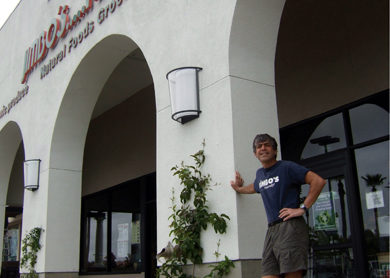On the flight to the West Coast, the one that began Jim Someck’s journey to success as a natural products retailer, he could not have predicted the path he would take. It was a path that eventually led to a thriving business—four retail locations in San Diego County, around 300 employees and throngs of loyal customers in love with the natural and organic selections that Jimbo’s…Naturally!, WholeFoods Retailer of the Year for 2012, has to offer. Someck, who goes by “Jimbo,” had a natural inclination toward the organic and wholesome before getting involved in retail. Once the seeds of the natural products industry were planted and took root, it wasn’t long before a fixed course was plotted. Someck was on his way toward creating the pillar of the Southern California organic community that his stores now comprise.
“Our vision, from 15 years ago,” says Someck, “is to have ‘A piece of organic fruit in every child’s reusable lunch bag.’” It’s certainly an inspiring and instructive treat to learn about that vision, and the deeply committed, unique, and often quite literal ways in which it’s implemented in everything that Jimbo’s…Naturally! does.
Go West, Young Man!
Born and raised in New York, Someck’s natural products story only began when he shifted time zones. After a year at Cornell University in the early 1970s left him feeling like he needed a break from school, Someck decided to head for California, where his older brother lived and where he had once spent a few weeks when he was 16. It was without a specific plan, other than to travel the coast, that he departed for this adventure, but he knew he was seeking a lifestyle change and a fresh perspective. The character traits and ideals that would eventually guide him to the culture of organic agriculture and sustainability were, importantly, already growing in him.
The setting, specifically, was San Diego, and there he came under the wing of his brother, who was involved in alternative education and related businesses. “Probably within the second day I got out here, I started working at Ocean Beach People’s Food, which is a co-op now, but at the time it was a workers’ collective,” Someck says, adding that it still exists, and is one of the most successful in the country.
Its beginnings were more humble. Someck’s first task at Ocean Beach People’s Food was, famously, breaking down cardboard boxes. He showed up to volunteer, in part because his brother thought it might be a good place to begin his “reeducation”, of sorts. The store was then housed in a one bedroom house, and when Someck arrived, a man greeted his announcement that he was there to volunteer with pleasure, and then said, “’There’s a whole bunch of boxes outside to break up, if you could get started that would be wonderful, and I’ll be out there in a little while to help you.’” After doing this for over an hour with no sign of assistance, Someck began to wonder what he was doing there.
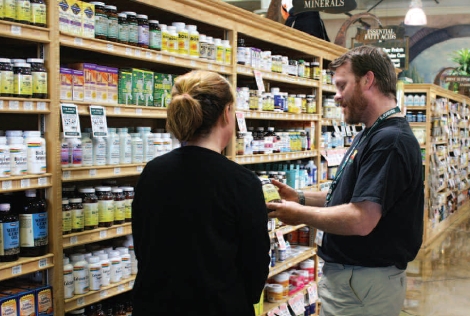
|
| Customer service is part of the culture at Jimbo's...Naturally! stores. |
Things got better, if only slightly. Continuing to volunteer, he began to be paid $1 in food credit for every three hours he worked, a wage he was reluctant to actually accept at first. Within a few months, he was asked to become a coordinator for the store. His background in business saw him get slotted in as the store’s business manager, an area that was lacking with the collective’s laid back environment, and this came with a big increase in pay at around $100 a month. In the wake of this development, Someck decided to go back to school to take accounting and business classes, to better his understanding of the ins and outs of retailing.
Someck thought this position would be temporary, but he ended up working there for 11 years. By the time 1984 rolled around, his mindset had shifted. Someck says, “I was getting frustrated with the decision-making process. It being a workers’ collective, it was one vote per person, and depending on what got decided one week, people might get upset and another group of people would show up the following week and overturn it. It wasn’t very efficient.”
Making some changes helped, especially after he became the store’s first manager. But soon enough, he’d resolved to venture out on his own, and open a new store. “By that time, I was passionate about it. I was passionate about organic foods. I believed in what we were doing. I feel like I was a pretty principled individual. I think I said, ‘I don’t care if I fail, or if I make a million bucks, as long as I do it the right way, and I’m true to myself and what I believe in. If I fail doing that, that’s okay, and if I succeed, that’s probably even better!’”
His prospects at this initial store, located in a building from the late 1930s in the North Park section of San Diego, had a low ceiling at first (literally, too—with a ceiling height under seven feet, former pro basketball star Bill Walton had trouble navigating the store as a customer in those days). Even getting the store open was tough. Someck details the anecdote of his contracting an illness just before the store opened, having already borrowed money from his parents and scrapping together what he had to open the store.
The building process had taken longer then he’d anticipated, and money was running low. He went to see the doctor, who asked him what was going on in his life. Someck told him truthfully that he’d been working seven days a week, 15 hours a day to get his store open. The doctor told him he had to stop. Someck returned that, being behind schedule and low on cash, he couldn’t afford to stop. Finally the doctor relented, and said he could work four days a week, for five hours a day, with an appointment to see him again in two weeks. Those two weeks later, Someck returned in better shape, and the doctor asked what he’d been doing. “I said, ‘I’ve been working seven days a week, 14 hours a day.’”
This tenacity was surely the foundation for that first store getting off the ground, as well as playing a significant role in the larger scale success of Jimbo’s…Naturally! in more recent times. That first store, though, had its challenges. It was in a retirement-heavy area, which meant a lot of older people with fixed incomes. “It was instrumental in my own education, because I realized that people, given time being exposed to different foods, eventually would switch over,” Someck says. But the hurdle of cost had to be cleared—people didn’t understand the price difference between the organic food Someck sold and what they saw at their conventional grocer. According to Someck, over time and through education, it became a successful store.
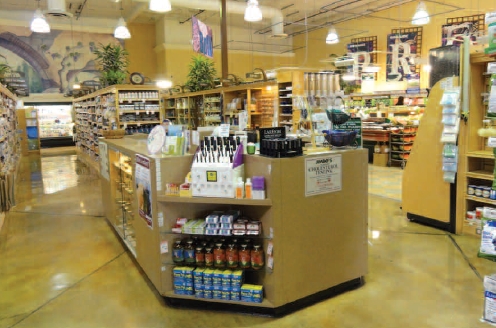
|
| The vitamin counter anchors the supplements and personal care section of each store. |
He recalls one of the most impactful comments he ever received from a customer. About a year into the store’s existence, an elderly gentleman who was a regular shopper asked to speak to Someck. This was a very meticulous customer, who wrote everything down in a notepad and knew his shopping costs down to the dollar. The man told him that he’d been shopping there a year, but before they’d opened, he’d shopped just down the street at a conventional supermarket. Someck thought he knew where the conversation was headed (“Why so expensive?”), but the man surprised him.
He told him that he’d compared his expenses between shopping with Someck and shopping at the supermarket, and found that it cost him an extra $200 or so to make the switch. “But,” the man said, “I’ve saved more than that on doctor’s bills, and I can’t tell you the value it has given me from a physical standpoint, because I feel so much better eating the food that you’re selling.” At that point, the true value of what he was doing was driven home to Someck. His customers were actually paying for their physical wellbeing, “and you can’t put a price on that,” he says.
There was a lot to build, and a lot of customer education to be done in those early years, when Someck says he took responsibility for nearly everything associated with the store, including knowing every customer that came in and generally doing what was needed to get the business off the ground. “It was important to me to try to be successful and put an image out of who we were. So it was a labor of love for a number of years,” he says.
He recalls the issues that would crop up now and again and push organic foods into the public eye, thereby driving up business (such as the Alar in apples scare of 1986). Though much of the public has now become more conscious of food safety issues and of the value of natural food, back then it was a concept slow to grow on people, particularly with the Internet yet to fully arrive. “It was a gradual process in the early years. By the time I opened up my second store, I felt we were pretty successful,” Someck says. He notes that a second store was not necessarily a must at the time in a business sense, but he believed in what he was doing enough that he wanted to see if he could find success again.

|
|
A visit to the deli counter turns up fresh meats and other fine choices. |
The values as a seller of food that Someck and his store embodied back then have expanded along with the chain. He had begun to shift his eating habits while still in school, thinking that he was not long for a diet that he was increasingly viewing as unhealthy. But when he started at the co-op in San Diego, he knew next to nothing about organics. When he began to absorb its virtues, from both a health and environmental standpoint, it started to become his way of life. For him, it became a hard sell, “that if you eat something with chemicals or pesticides and you put it in your body, that it doesn’t have some kind of impact,” he says. He saw the banning of chemicals in other countries that were still used in the U.S. food industry, and it all made little sense to him. This made him resolve to feel good about what he was selling in his first store, where he says the ratio was probably 50/50 organic to conventional at first, at a time when certified organic supplies were not as prevalent. “I was hopeful over time that it would just gravitate more and more towards organic,” he says, while estimating that Jimbo’s…Naturally! is probably a 95 to 98% organic retailer today.
Jimbo’s Today
Walk into one of the four Jimbo’s locations today, and you’re likely to come face to face with this store’s bread and butter—fresh produce. Or, your first encounter may be with their deli counter, stocked with organic meats not often offered by competitors. Most everything at these counters is made right in the store, and the policy is to use organic supplies wherever possible. The four locations, by store name and date of opening, are as follows: Carmel Valley, 1992; Escondido, 1997; Carlsbad, 2003; and 4S Ranch, 2007, all in San Diego County. And, the ink is still drying on an agreement to expand the chain with a 28,000 sq. ft. fifth store, which will be in a unique location on the second floor of the Horton Plaza shopping mall in downtown San Diego. Someck’s first store from 1984 was subsequently sold in 1997. The current stores range from 16,000 to 18,000 sq. ft. on average.
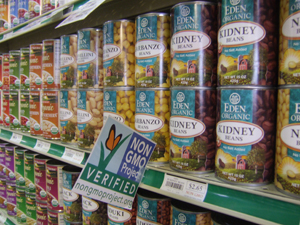 Continue with your walking tour, and coming to the store’s middle and you will find around three aisles of supplements, and in the middle of those a vitamin counter from which the dedicated supplements employee surveys the area. Circle around the outer aisles and you’ll come to the frozen meat section, and eventually to Jimbo’s other frozen foods and bulk food items. A visit to Jimbo’s may also turn up an on-site bakery and a juice bar. One visually unique element of the stores is the works of art that convey a sense of place. “We have murals in every store, that kind of depict the environment or the area the store is in. The Carmel Valley store is near Torrey Pines [Golf Course], so there’s a mural of Torrey Pines.”
Continue with your walking tour, and coming to the store’s middle and you will find around three aisles of supplements, and in the middle of those a vitamin counter from which the dedicated supplements employee surveys the area. Circle around the outer aisles and you’ll come to the frozen meat section, and eventually to Jimbo’s other frozen foods and bulk food items. A visit to Jimbo’s may also turn up an on-site bakery and a juice bar. One visually unique element of the stores is the works of art that convey a sense of place. “We have murals in every store, that kind of depict the environment or the area the store is in. The Carmel Valley store is near Torrey Pines [Golf Course], so there’s a mural of Torrey Pines.”
Someck estimates the breakdown of product sales at 20% for produce, 14% from the delis, 15% in supplements, 9% in meats, and around 42% in grocery shelf items, both frozen and bulk. According to Someck, this current product mix was something that developed organically (in more than one sense).
The introduction of meats to his stores took some time. As a vegan, he struggled with the concept at first. While they sold some meat, the selection was limited. Then one day while his wife was pregnant with one of their four children, she had a craving for meat that could only be met by going to another store. “It just hit me that we shouldn’t be selling only products that I eat, otherwise we could probably house that in my office. It really should be the best-quality products from the entire gamut of what is out there to sell,” Someck says.
The concept of being a dietary supplement store took some getting used to, as well. “I wasn’t big on supplements, because I always felt like you should get your nutrients from the food you eat. Over time, I’ve come to realize that people will use their bodies in different ways,” he says. The one constant, in what is a common refrain for Someck and the hallmark of his stores, has been organic produce.
Demographically, much of the Jimbo’s…Naturally! clientele base hails from relatively high-income areas, and many customers are well-educated. This, Someck notes, is typical of natural products consumers. The process  of nurturing and informing one’s customer base, Someck has found, varies depending upon a given natural food store’s environment.
of nurturing and informing one’s customer base, Someck has found, varies depending upon a given natural food store’s environment.
Regardless of their prior history with natural foods, new Jimbo’s customers become loyal ones. “While they may go somewhere else to pick up some ancillary products, we have a lot of dedicated and loyal customers, which is why when Whole Foods [Market] opened up their store near my Carlsbad store, we were hardly impacted,” Someck says. These Jimbo’s…Naturally! believers categorize their favorite store, first and foremost, as a natural food grocer with an emphasis on high-quality, organic food.
Someck views that connection as important to their success. “One of the things I recognized early on is that, especially when the economy got hit, a number of our customers, especially if they have families and kids, are willing to give up a lot of things that they themselves may say they want,” but typically will not give up good food for their kids, he says. Once the decision is made that organic is important, when budgets gets tight, the last thing to go is organic and natural food for the family. As a parent himself, Someck is of the same mind, saying he’d rather deprive himself than take a healthy diet away from his kids.
Reaching Out, Jumping In
When it comes to marketing themselves, very little of what Jimbo’s…Naturally! does is geared toward price. In fact, engagement may be a better word than marketing for their approach to both customers and community. “When I hired my first director of marketing, probably the primary goal I laid out for her was to get involved with the kids,” says Someck. This focus has evolved through the years, and includes diving into local schools to see where help is needed and to host events, and influencing young children to try foods to which they aren’t normally exposed. He states, “Probably one of the highest compliments I’ve ever gotten was when one of the volunteers for a school said, ‘We hesitate to ask you for anything anymore, because we know you’re going to say yes.’ And so I said, ‘Well that’s good, because we want to say yes, and we want to continue to remain involved.’”
This engagement with the schools was extended to community involvement in general, and Someck notes that without their support, his stores don’t succeed. “I think that a lot of our customers recognize us from our involvement in the schools and the community, and so there’s a sense of loyalty to us because of who we are and what we do,” says Someck. He describes a recurring event at local schools that involves an interactive stir fry session that feeds students, while exposing them to healthy food and cooking. “I think that’s the way it should be. We’ve always wanted to be a socially responsible organization, and part of that is giving back to the community,” he adds.
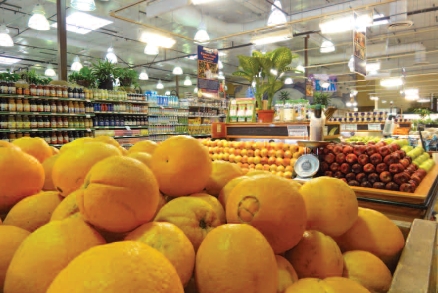
|
|
Fresh produce: at the foundations of the store’s success, since 1984. |
Another longstanding and popular program takes place in-store. It’s in the Bag is a recycling program that aids charity while making an environmental impact. The stores got rid of plastic bags entirely in 2008, and this innovative program began all the way back in 1999. Someck explains how it works: If someone brings in a reusable bag, the store either hands them a real nickel, or a special Jimbo’s wooden nickel. Each quarter, the company selects several different nonprofits as recipients. Customers can take their wooden nickels and deposit them in bins dedicated to each nonprofit. At quarter’s end, the store tallies up the wooden nickels and writes a check for that amount. In addition to the sales of reusable bags at each store, this program has seen over 2,342,000 bags reused at Jimbo’s…Naturally! locations, according to the company.
Blending this commitment to sustainability with community involvement is the company’s Kids C.A.R.E. (Children Achieving Rhythm with the Earth) campaign, a year-round program for kids 12 and under that includes a monthly newsletter. Then there’s Earth Week, the company’s own take on an important theme. “It seemed like Earth Day was taken over by some of the large corporations that didn’t seem to totally embody the spirit of Earth Day. We’ve kind of gravitated to doing our own thing,” Someck says, and that has included the literal enactment of their vision statement: the distribution of pieces of organic fruit in recycled lunch bags to hundreds of local kids. The company’s outreach has also seen Someck, an avid runner, do 100 laps at a local school track for charity. “Part of it for us is to start exposing kids at a young age not just to quality food, but to environmental issues and sustainability,” he says.
Back at the store, the policy on customer feedback is open and inviting. Someck says he’s learned his lesson from companies that may celebrate a reduction in customer complaints from one year to the next, but that only see such results due to a chilly relationship with their customers. He says, “My perspective on it has always been that even though it may hurt to hear negative feedback, it can only benefit you.” Even situations involving irate customers reporting a bad experience are viewed for their silver linings, which is the opportunity to improve and take the next step, Someck believes.
A Customer Bill of Rights
The company’s pledges to its customers go beyond the already discussed vision statement (“A piece of organic fruit…”). It’s no surprise, for instance, that the customer is prioritized first and above all else at Someck’s stores, as most retailers will claim to do this. But at Jimbo’s…Naturally!, they make sure their customers know all about it. The company’s level of dedication to the health and access their customers enjoy is inscribed on the walls of each Jimbo’s store.
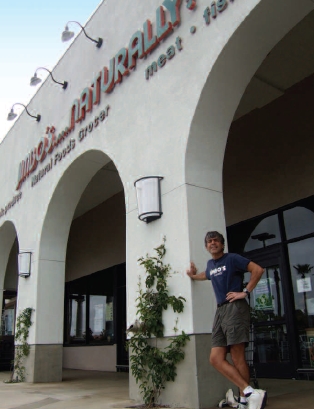
|
|
Jim “Jimbo” Someck (pictured) takes a breather outside the Carmel Valley location. |
The Jimbo’s mission statement reads, “We do the Right Thing, by Providing the Highest Quality Organic and Natural Foods.” This is expanded into a Bill of Rights, which begins “We at Jimbo’s do the right thing...”, and highlights of which include: “…By listening closely to our customers so that we can serve them right the first time, and even better the next time.” Another, related to the employee/employer relationship, reads, “…By providing a positive, friendly, supportive and caring work environment, competitive compensation, benefit and retirement programs and by continually recognizing our employees, while motivating and encouraging them to strive for excellence.”
Someck acknowledges that a retailer’s reason for existing is to serve its customers. But when it comes to the employee relationship, he knows it is the last thing that can be overlooked. “You’re only as good as the people you have working for you. You could have the best products in the world,” but if your people aren’t taking care of your customers, there won’t be too many repeat shoppers, he says. Though he may strive to set the tone, “Ultimately the staff that I have, in all the stores, from the operations team, most of them with me for 10 years, to the frontline staff—they’re just phenomenal.”
While it has been easy for the focus of the various accolades and awards that the store has garnered through the years to be on himself, because he is the owner and his name is on the sign, he fully acknowledges the role that his staff has played in that recognition and does not dismiss it lightly. He says, “It feels wonderful to be given this recognition, but I can honestly say that these awards are truly the result of all the tremendous work that the Jimbo’s staff does. Their contributions cannot be exaggerated.” That fact, he adds, and the support he receives from his wife and children, are what keep him going.
From his beginnings in the business and accounting end of retail, Someck’s working role has evolved along with his point of view. He now focuses on the employee and customer experiences, as well as his broader vision for the stores. “It’s kind of interesting: the less time I spend on the bottom line, the better it is,” he says. “The more time I spend on the other aspects, it seems to manifest itself in a better bottom line. It’s given me a whole new perspective on how to approach what we do.”
Non-GMO Leaders
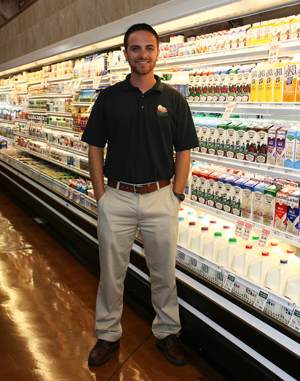 One can’t ignore the stance of Jimbo’s…Naturally! on perhaps the hottest natural food industry issue of today, the movement against and in favor of the labeling of genetically modified organisms (GMOs) in food. The epicenter of the issue has in many ways been California, especially in recent months with the California campaign to label GMOs.
One can’t ignore the stance of Jimbo’s…Naturally! on perhaps the hottest natural food industry issue of today, the movement against and in favor of the labeling of genetically modified organisms (GMOs) in food. The epicenter of the issue has in many ways been California, especially in recent months with the California campaign to label GMOs.
As passionate as Someck became about organic when he entered the industry, he is just as passionate about GMOs now. He personally picked up the thread of this issue about four or five years ago, and this interest saw Jimbo’s…Naturally! sign up with the Non-GMO Project, which verifies that products contain no more than a specific, miniscule percentage of GMOs (0.9%). It wasn’t until more recently that Someck had a further epiphany. “It was probably about two-and-a-half years ago it really hit me that we needed to make a stand,” he says. So, he joined the retail advisory board of the Non-GMO Project, to gain more of a role in addressing what he believes may be the biggest issue facing the industry.
The California “Right to Know” Ballot Initiative enlisted volunteers to gather enough signatures to place the GMO labeling issue on the ballot for the next election. The campaign successfully garnered enough signatures, and activists now will work to drum up voter support for the issue. For his part, Someck says that the Jimbo’s policy on GMOs is among the strictest he’s seen. A couple of years ago, he felt compelled to write a letter to his customers outlining their stance. It began, “While we do not claim to be GMO-free, we are moving in that direction,” and continued on to describe the way that Jimbo’s will seek to systematically rid itself of products potentially containing GMOs. Unless they are Non-GMO Project verified, any new products containing ingredients that are often genetically modified, like non-organic versions of corn, soy or canola oil, are prohibited, and those already on the shelves will not be promoted by the store. Meanwhile, they encourage current vendors to acquire Non-GMO Project verification if they have not already.
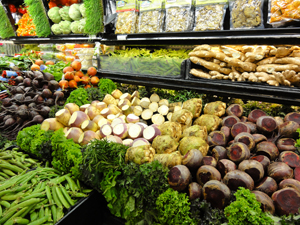 When these decisions were made, Someck met with some of his buyers, who wondered aloud if they weren’t hamstringing themselves a bit. People who want a given product that they’ve prohibited will surely go elsewhere. “I said, ‘That’s fine.’ At some point, you have to make a stand for what we believe in. And ultimately, if our consumers are who I think they are, then it’s going to be beneficial to us,” he explains, noting that he has seen some of that trust build in Jimbo’s customers.
When these decisions were made, Someck met with some of his buyers, who wondered aloud if they weren’t hamstringing themselves a bit. People who want a given product that they’ve prohibited will surely go elsewhere. “I said, ‘That’s fine.’ At some point, you have to make a stand for what we believe in. And ultimately, if our consumers are who I think they are, then it’s going to be beneficial to us,” he explains, noting that he has seen some of that trust build in Jimbo’s customers.
The brokers the company works with appreciate their non-GMO perspective, and the stance has persuaded a number of manufacturers to make changes, meaning they’ve gone organic or pursued Non-GMO Project verification. Other stores have also contacted Jimbo’s for advice on going in the same direction. “I’m sure we’ve maybe hurt ourselves a little bit. But in the long-run, we’re doing what’s right for who we are and what we believe in,” Someck says. “I think every consumer has a right to know what’s in their food.”
He anticipates the response from advocates of GMO crops, which will involve claims about enhanced production and other benefits, but Someck contends that the effect of GMOs will prove a net negative for society amid the uncertain health impact of their consumption. As to the future of the movement, he predicts, “Even if we don’t win the initiative, if we can draw attention to it, I think it’s going to make a stronger case for eventually having labeling.”
Someck has taken strong note of the gluten free explosion, too. “It’s no longer a fad. I think through the years there’ve been things that come through the industry, and you never know for sure whether it’s going to last or it’s going to die out,” he says. Gluten free is here to stay, simply because, “There are too many people that truly have an issue with gluten. If anything, the emphasis on gluten-free products is going to get stronger over the next few years.” He hopes that increased attention and market size will mean a greater selection for these people in the years to come.
In the end, though, it all comes back to organic for Someck. “The last operational day-to-day job that I gave up was ordering produce, because I loved it so much,” he says, adding that he truly enjoyed working with local farmers. In the 1980s, when he and those farmers formed local and organic business partnerships, there was often no organic certification to rely upon for validation. Now, organic and local are buzzwords, and that early support was crucial for organic farmers, especially those transitioning to organic who were supported by retailers like Jimbo’s with a commitment to buy. Then as now, he feels organic is the heart and soul of the store.
Staying True
The relationship that Someck’s stores maintain with their product vendors would best be gauged, to hear Someck tell it, by asking those vendors how they view Jimbo’s. He describes these partnerships as dedicated and set up for the long-haul. Unless something goes truly off kilter, he says, they’ve stayed with vendors through thick and thin, even maintaining relationships with some that no longer offered the best pricing.
|
INFRA: The Voice of Natural Retailers Jimbo Someck had a role in the creation of a very important resource for today’s natural product retailer. Cooperatively owned and governed by natural and organic food retailers, the mission of the Independent Natural Food Retailers Association (INFRA) is to leverage the collective influence of its members into greater opportunities in many areas, from operational support and purchasing power to marketing platforms. “As a company with only four stores, no matter how hard I yell, I probably will have very little chance of being heard, compared to having 127 stores with the volume that we do. So [INFRA] really has an important place in the marketplace,” says Someck. He was one of the original handful of retailers that formed INFRA in 2005, after discussions took place about the feasibility of such an organization. Now, it has grown to encompass 79 stores with 127 locations, with a collective $714 million in business between them. “I think all the stores that have joined have seen so much benefit from it, and it makes the independents as a whole a lot stronger. It really enables you to feel like you’re not alone, no matter where you are.” INFRA has progressed into a forum for sharing best practices as well as general experiences in running a retail outlet. Someck says, for instance, that while if one has a question about a refrigeration system, one could simply go online or ask the refrigeration company, a better answer comes from seeking the wisdom of one’s peers. He says there is an online listserve format where such discussions among INFRA members can take place. Stores large and small and spread across the entire country now belong to INFRA. Someck describes it as an entity that now has its voice, one that other retailers can and do look to for opinions and guidance. |
In Someck’s view, partnership often trumps price and other factors. He describes Jimbo’s as a company that has always paid on time, never failing to pay a bill, particularly to farmers. “I admire farmers. Maybe part of the reason I’m so passionate about it is that they’re always at the mercy of the elements, and yet they continue to do what they do, which is provide us with quality food,” he says. He often hears from farmers that they’d rather deal with Jimbo’s than some national buyers, and it’s because they can depend on timely payments and follow-through on commitments to buy. If Jimbo’s has promised to help move some stock out for a farmer, they can be counted on to do it.
But the days of dealing directly with farmers and other day-to-day operations are mostly behind Someck. These things he leaves to his trusted team. “We have what we call our operations team of 18-20 individuals, who have various different job titles from COO to general manager to regional buyers to store managers to IT to marketing. These folks are the people that really oversee the day to day operations,” he says. Without these individuals, Someck says, the chain could not succeed.
Someck’s current role is in maintaining the long-term vision of the store, as illustrated by his work in the non-GMO area, and in making sure his operational leaders are working in concert with each other. A strong organizational focus on human resources helps keep employees informed and engaged with their performance and their prospects for advancement. “We are very conscious of making sure that employees get feedback and know where they stand. We owe it to them,” Someck says.
Outside the walls of the store, there is of course competition to be reckoned with. There are three, and soon to be four Whole Foods Market locations in the vicinity of his stores, as well as other natural retailers like Sprouts and Trader Joe’s. Due to a diverse and quality product mix, their extensive focus on organic and strong customer service, Someck expects to continue to compare well. But beyond the prospects for his business, he sees the big picture for the natural products industry. “If someone comes along and does a better job, then so be it,” he says. If organic and non-GMO can succeed on a large scale and reach more people than ever before, count Someck as happy.
Competition from online has crept in as it has for all brick-and-mortar retailers. “Nutrition sales have probably been flat over the last four or five years, I think mainly because you can definitely buy supplements online.” He goes on to state, though, “I think there’s an experience that you can’t exchange, especially on the produce and the deli side, that you just can’t do online. If you’re that kind of person that wants to see and feel and touch the product, taste the product—you’re not going to get that online,” he says, adding that this is more often than not the type of customer whom Jimbo’s…Naturally! attracts.
As the natural products industry evolves toward the future, Someck sees a trend involving the dilution of ownership and the original intent behind many companies, and wonders what this will mean for the ideals the industry hangs its hat on. He states, “A lot of the companies that are in the industry have been bought out by more conventional companies. The concern is, do these conventional companies continue the values that drove the original company?” There is also the question of whether enough smaller companies, embodying the passion and values the industry was founded on, will crop up to replace those leaving the industry in this way.
“There’s a heart to the industry that is somewhat too intangible to describe in words, but is a key component of it,” Someck says. Some people, he knows, don’t care what they’re selling so long as it’s profitable. “Whereas, I think a lot of the people in the natural foods industry came from a place of doing what’s right and doing what’s good.” He colors himself optimistic that there are enough of these people, and perhaps even more who are value-driven today than years ago, to fully support the future of the industry he grew up in. WF
Published in WholeFoods Magazine, July 2012

